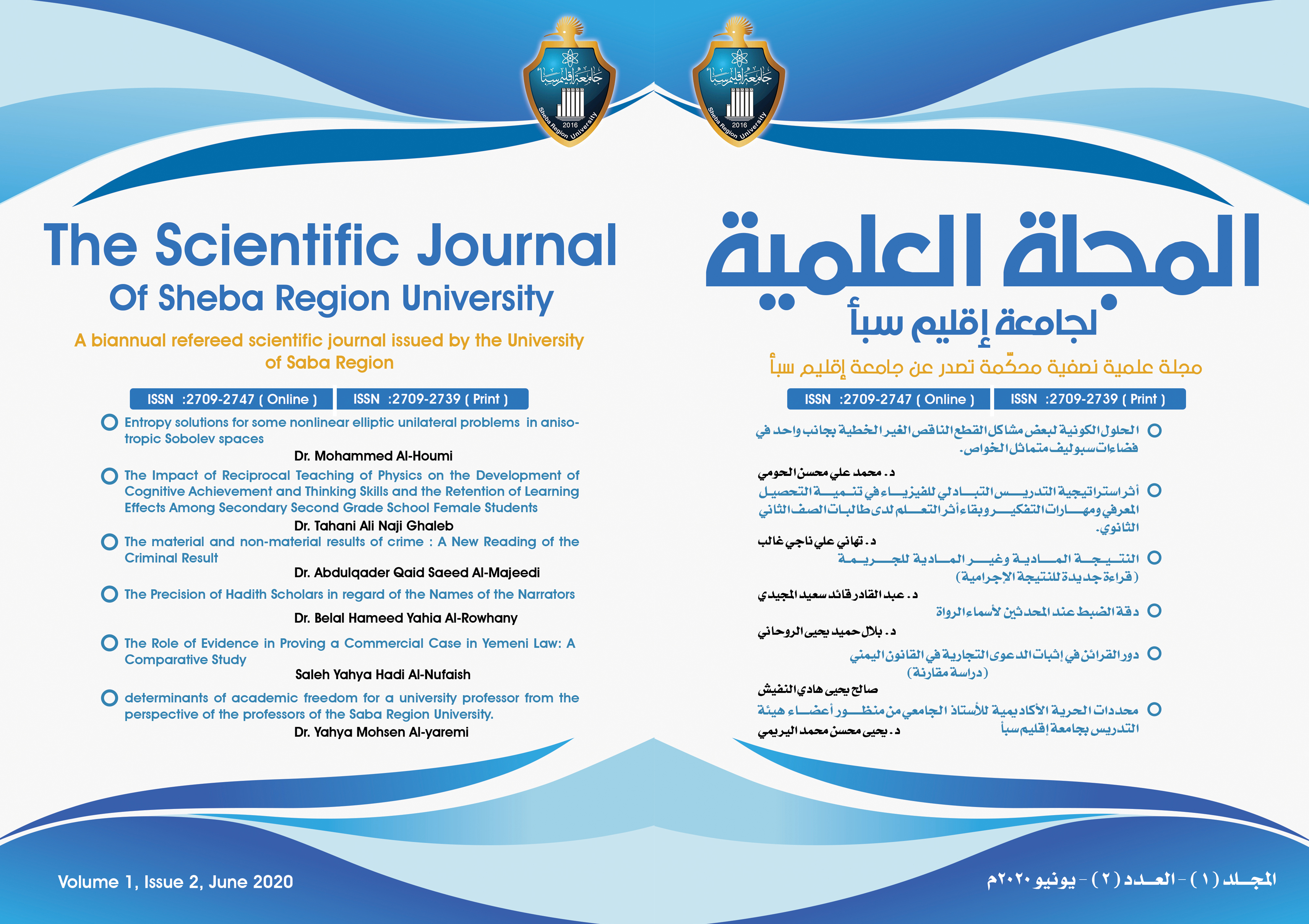دور القرائن في إثبات الدعوى التجارية في القانون اليمني (دراسة مقارنة)
The Role of Evidence in Proving a Commercial Case in Yemeni Law: A Comparative Study Saleh Yahya Hadi Al-Nufaish
الملخص
وقد اتبع الباحث في هذه الدراسة: المنهج الوصفي التحليلي والمقارن. واحتوت الدراسة على مقدمة وأربعة مباحث، وقد بين الباحث في المقدمة: أهمية البحث في كون الإثبات بالقرائن من طرق ووسائل الإثبات غير المباشرة، والتي لها دور كبير في ارشاد القضاة إلى الحقيقة والصواب في الدعاوى المنظورة أمامهم؛ من خلال استقرائهم واستنباطهم للقرائن من الوقائع في الدعاوى محل النزاع، كما تظهر أهداف البحث في مدى إثبات الدعوى التجارية بالقرائن في القانون، وتناول الباحث في المبحث الأول: تعريف القرائن وحجيتها، وفي المبحث الثاني: العمل بالقرائن في حالة تسلم المرسل إليه والناقل الأمتعة أو البضائع دون تحفظ، وفي المبحث الثالث: العمل بالقرائن في حالة قبول الكمبيالة على وجود مقابل وفائها، وأخيراً تناول الباحث في المبحث الرابع: أمثلة على القرائن في بعض مواد القانون التجاري. وكان أهم ما خرج به الباحث من النتائج أن القرائن دليل مشروع للإثبات في الدعوى المدنية والتجارية، خاصة القرائن الحديثة بما كفله الشرع والقانون. وأما أبرز التوصيات: تفعيل القوانين فيما يخص الإثبات بالقرائن أمام المحاكم الشرعية وأجهزة القضاء، والفصل بين القواعد الموضوعية والقرائن القانونية.
Abstract
This study uses the descriptive, analytical and comparative approach. It includes an introduction and four sections. The introduction shows the significance of the research since it indicates the importance of presumptions as one of the indirect methods of proof that has a great role in guiding judges to the truth in court proceedings. That can be achieved via deduction and deduction of presumptions from the facts in the proceedings in dispute. The introduction also presents the objective of the study. The first section, however, discusses the definition of presumptions and their validity. In the second section, the researcher discusses taking into account presumptions in the case that the consignee and the carrier received the luggage or goods without reservation. The third section discusses taking into account presumptions in the case of accepting bills on the existence of an exchange. Finally, the fourth section presents examples of presumptions in some articles of the commercial law. The most important finding of the study is that presumptions are legitimate evidence in civil and commercial lawsuits, especially modern presumptions guaranteed by Sharia law and common law. The study also recommends activating laws concerning proof by presumptions in Sharia courts and judicial bodies, as well as differentiating between objective rules and legal presumptions.
التنزيلات
منشور
كيفية الاقتباس
إصدار
القسم
الرخصة
حقوق النشر والترخيص
تنشر هذه المجلة جميع المواد العلمية بموجب رخصة Creative Commons Attribution 4.0 International (CC BY 4.0) ، والتي تمنحك الصلاحيات التالية:
لك مطلق الحرية في:
- المشاركة — نسخ وتوزيع ونقل العمل لأي وسط أو شكل. لأي غرض، بما في ذلك تجارياً.
- التعديل — المزج، التحويل، والإضافة على العمل. لأي غرض، بما في ذلك تجارياً.
- لا يمكن للمرخِّص إلغاء هذه الصلاحيات طالما اتبعت شروط الرخصة.
بموجب الشروط التالية:
- نَسب المُصنَّف — يجب عليك نَسب العمل لصاحبه بطريقة مناسبة ، وتوفير رابط للترخيص، وبيان إذا ما قد أُجريت أي تعديلات على العمل . يمكنك القيام بهذا بأي طريقة مناسبة، ولكن على ألا يتم ذلك بطريقة توحي بأن المؤلف أو المرخِّص مؤيد لك أو لعملك.
- منع القيود الإضافية — يجب عليك ألا تطبق أي شروط قانونية أو تدابير تكنولوجية تقيد الآخرين من ممارسة الصلاحيات التي تسمح بها الرخصة.
ملاحظات:
لا يتوجب عليك الامتثال لشروط الرخصة مع العناصر الخاضعة للملك العام في المصنف أو إذا كان استخدامك ضمن نطاق الاستثناءات أو الصلاحيات .
بدون ضمانات. قد لا توفر لك الرخصة كل الصلاحيات التي تحتاجها لغرض معين. فمثلاً، الحقوق الأخرى مثل الشهرة، الخصوصية، أو الحقوق المعنوية قد تحد من استخدامك المُصنَّف.











